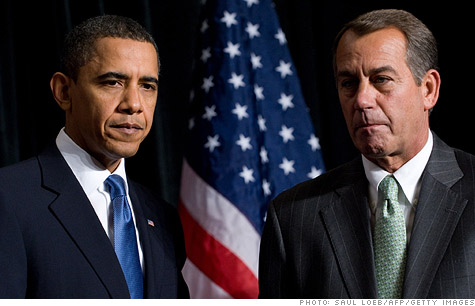This isn’t an original theme. The reference was suggested to me two years ago by the governor of Pakistan’s Punjab province, Salman Taseer, three months before he was killed by one of his bodyguards in Islamabad.
Speaking at his farm outside Lahore, Taseer sarcastically quipped about U.S. politics that the Tea Party must have come from Lewis Carroll’s “Alice in Wonderland” and the Mad Hatter. He was right.
The debate and debacle over the “fiscal cliff” is straight from the looking glass.
At one end of Pennsylvania Avenue, to mix metaphors, Little Lord Fauntleroy, aka President Barack Obama, is stamping his foot demanding an increase in tax rates for the wealthiest 2 percent of Americans.
Obama cynically knows that these increases won’t come close to shrinking the annual budget deficit of more than $1 trillion or the national debt that is racing toward $17 trillion. But he is out to do the Republicans in and win control of the House of Representatives in 2014.
If House Republicans stonewall, Obama will use that as a political bludgeon to beat them to pulps at the voting booths.
If they capitulate, the win will fortify the president’s mandate and reinforce his political capital.
Unfortunately, the Republicans have their own Fauntleroys and characters from Wonderland. They haven’t been able to mobilize or even concoct a more palatable budget alternative that resonates with the public.
So, as the Queen of Hearts tells Alice, “sentence first, verdict afterwards” appears to be the way this impasse is headed despite three undeniable facts — recognizing that in Washington, political correctness means that everyone is entitled to their own version of the facts.
No. 1 fact is that to tame the deficit and debt, spending must be cut.
No. 2 fact is that spending cuts alone won’t work. Revenues must be raised.
And No. 3 fact is that entitlement programs and the tax code must be reformed if the United States is to get its financial house in order.
Almost certainly, only No. 2 will happen.
Is there any way around this standoff? The answers are quite simple. Yet, as Clausewitz observed about war, even the simplest of activities can become impossible in the fog and friction of battle. The same applies to politics. Consider three remedial and simple solutions.
First, because increasing tax rates as opposed to raising revenues cannot work alone to resolve budget imbalances and because history has repeatedly demonstrated that promises to cut spending following tax increases rarely happen, there is still a way to reconcile this conundrum. Congress should agree with the president and pass a tax increase for the top 2 percent but with a one-year limit and dependent upon spending cuts and reforms of the tax code and entitlement programs actually taking place. Such legislation would force the president and Democrats to make good on their pledges or face the consequences when the legislation expires.
Second, as repeatedly argued in this column, a national infrastructure bank is needed now. With corporations and individuals keeping trillions of dollars sidelined, and the nation’s infrastructure in unconscionable disrepair, this idea is nearly a no-brainer. By offering interest rates 3 or 4 percentage points higher than current government bonds and applying tolls and user fees from the infrastructure projects for new bridges, roads, power grids and the like, this bank would be self-funding.
The government would guarantee the bonds. But because financing would come from the private sector no increases in the debt or deficit would occur. And a trillion-plus dollars in this bank would jump-start the economy and provide for the nation a 21st-century infrastructure it so desperately needs.
Last, both ends of Pennsylvania Avenue must recognize the despite how serious the fiscal cliff may or may not be, a strategic abyss looms that no one has chosen to recognize. At best, the fiscal crisis in Europe means that our traditional allies are more inward looking and unenthusiastic about embracing international responsibilities. At worst, a divided or fractured Europe threatens the cohesion of the Atlantic alliance that has been the bedrock for our security since the start of World War II.
From the Maghreb to the Indian Ocean, Egypt, Syria, Iraq, Afghanistan and Pakistan are ticking time bombs. What happens with Iran and its nuclear ambitions could be the fuse that ignites some or all of these explosive possibilities. Sadly, as Nero fiddled and the Titanic filled with water, no one in Washington seems concerned about these potential geostrategic earthquakes and avalanches, preoccupied with politicking over taxes and spending.
Salman Taseer was right about the Alice in Wonderland analogy. We are in a Wonderland twilight. Except this is the real world and not Wonderland!
Harlan Ullman is senior advisor at the Atlantic Council, and chairman of the Killowen Group that advises leaders of government and business. This article was syndicated by UPI.
Image: obama_boehner.jpg
